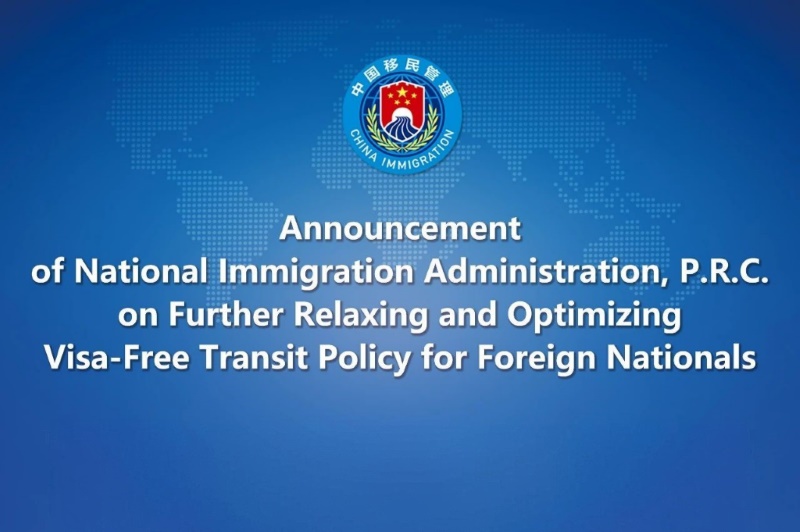
Upon approval by the State Council of the People's Republic of China, the National Immigration Administration (NIA) has decided to further relax and optimize the visa-free transit policy for foreign nationals, effective immediately. The announcement is given as follows:
I. Extended Stay Duration. The stay duration for foreign nationals eligible for visa-free transit has been extended from the previous 72 hours and 144 hours to 240 hours (10 days).
II. Expanded List of Ports. A total of 21 ports, namely Taiyuan Wusu International Airport in Shanxi Province, Su Nan Shuofang International Airport and Yangzhou Taizhou International Airport in Jiangsu Province, Wenzhou Longwan International Airport and Yiwu Airport in Zhejiang Province, Hefei Xinqiao International Airport and Huangshan Tunxi International Airport in Anhui Province, Fuzhou Changle International Airport, Quanzhou Jinjiang International Airport, and Wuyishan Airport in Fujian Province, Nanchang Changbei International Airport in Jiangxi Province, Jinan Yaoqiang International Airport, Yantai Penglai International Airport, and Weihai Dashuipo International Airport in Shandong Province, Zhangjiajie Hehua International Airport in Hunan Province, Nanning Wuxu International Airport and Beihai Fucheng Airport in Guangxi Zhuang Autonomous Region, Haikou Meilan International Airport and Sanya Phoenix International Airport in Hainan Province, Chengdu Tianfu International Airport in Sichuan Province, and Guiyang Longdongbao International Airport in Guizhou Province, were added to the list of ports under the 240-hour visa-free transit policy for foreign nationals. Consequently, the total number of listed ports has increased from 39 to 60 (see Attachment 1).
III. Expanded Areas Allowed for Visa-Free Transit Travelers. The number of provinces (autonomous regions and municipalities) that can be visited under the 240-hour visa-free transit policy has increased from the original 19 (Beijing Municipality, Tianjin Municipality, Hebei Province, Liaoning Province, Heilongjiang Province, Shanghai Municipality, Jiangsu Province, Zhejiang Province, Fujian Province, Shandong Province, Henan Province, Hubei Province, Hunan Province, Guangdong Province, Guangxi Zhuang Autonomous Region, Chongqing Municipality, Sichuan Province, Yunnan Province, and Shaanxi Province) to 24 (with Shanxi Province, Anhui Province, Jiangxi Province, Hainan Province, and Guizhou Province added to the list). In the newly added five provinces, the allowed areas for visa-free transit travelers in Anhui Province, Hainan Province, and Guizhou Province include the entire province. In Shanxi Province, the areas are limited to Taiyuan and Datong, and in Jiangxi Province, the areas cover Nanchang and Jingdezhen. The areas in Fujian Province, Hubei Province, and Shaanxi Province are expanded to the entire respective provinces, and in Guangxi Zhuang Autonomous Region, the area expands to the administrative regions of Nanning, Liuzhou, Guilin, Wuzhou, Beihai, Fangchenggang, Qinzhou, Guigang, Yulin, Hezhou, Hechi, and Laibin. Foreign nationals entering China through the visa-free transit policy can plan their cross-province visits within the allowed activity areas in these 24 provinces (autonomous regions and municipalities).
After the implementation of the 240-hour visa-free transit policy, citizens from the 54 eligible countries (see Attachment 2), may enter visa-free from any of the 60 open ports in the 24 provinces (autonomous regions and municipalities) with valid international travel documents and interline passenger tickets with specified dates and seats when traveling from China to a third country (region), and stay within the allowed areas for visa-free transit travelers for no more than 240 hours. (Subject to the relevant provisions if applicable to a mutual visa exemption agreements signed with China or China’s unilateral visa exemption.) During their stay, transit visa-free travelers may engage in tourism, business, visiting, family visits, and other activities, while activities such as work, study, and news reporting that require prior approval should be carried out with the necessary visas in advance.
Attachments:

National Immigration Administration
December 17, 2024
Contact Us

Support Center
Support Representative



